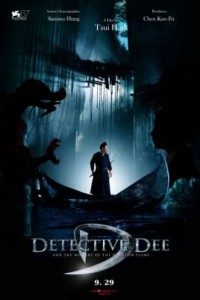 Detective Dee and the Mystery of the Phantom Flame is the newest film from Hong Kong mini-mogul Tsui Hark — best known for producing John Woo’s early classics and directing Jet Li’s Once Upon a Time in China. His forays into American action cinema aren’t as notable, unless you’re a huge fan of the 1997 Jean-Claude Van Damme, Dennis Rodman and Mickey Rourke joint, Double Team.
Detective Dee and the Mystery of the Phantom Flame is the newest film from Hong Kong mini-mogul Tsui Hark — best known for producing John Woo’s early classics and directing Jet Li’s Once Upon a Time in China. His forays into American action cinema aren’t as notable, unless you’re a huge fan of the 1997 Jean-Claude Van Damme, Dennis Rodman and Mickey Rourke joint, Double Team.
The gist of the film is thus:
In the year 690 AD, Wu Zetian (Carina Lau) is readying for her ascension to the throne, at which time she will become China’s first empress. But her upcoming coronation ceremony is threatened by seemingly supernatural forces, when two high-ranking government officials spontaneously combust in public. To solve the mystery the empress is forced to turn to a man she had imprisoned eight years prior for opposing her reign — the famed Detective Dee (Andy Lau). Wu Zetian naturally does not trust Dee, so she pairs the detective with her right hand “man” and faithful servant Shangguan Jing’er (Li Bingbing), a no-nonsense female warrior who immediately bumps sexual tension heads with Dee. As the mystery unfolds, shit gets crazier.
Dee is fanciful historical fiction. Wu Zetian was a real empress, and Detective Dee (actual name was Di Renjie) was indeed a famed public official during her reign. Author Robert van Gulik re-purposed the historical figure as “Judge Dee” for a series of popular mysteries in the mid-20th-century. It is this fictionalized character that is continued here. While I imagine that knowing some Chinese history would add context and swifter accessibility to the film (I admittedly did not entirely grasp Empress Wu’s backstory), based on my casual googling Dee seems pretty wildly inaccurate to the actual events of that period, so I also suppose it doesn’t actually matter. Similarly, having an existing familiarity with the character of Judge Dee probably makes this a more enticing viewing prospect – like catching a new adaptation of Sherlock Holmes – but I don’t think going in blind (as I did) detracts from the enjoyment.
Bottom line, Dee is an entertaining film. Tsui Hark brings an adventuresome energy to both the story and the action, and the mystery is treated with a jolly care. Given the possibly supernatural nature of the mystery, at times the film reminded me a bit of Barry Levinson’s Young Sherlock Holmes — in a good way. At other times I got a slight hint of Terry Gilliam, mostly because of some of the imaginative and massive settings; particularly a cavernous underground bazaar sequence. The relationship between Dee and Jing’er is a bit typical, depending on your tastes for bickering buddy cop sexual tension. More interesting is the other buddy cop relationship between Dee and the surly albino Pei Donglai (Chao Deng), who had been investigating the deaths prior to Dee taking charge. Also a typical case – here a supporting character who initially resents our hero, but slowly learns to respect and admire him – it plays out with more entertaining results than the quasi-romance with Jing’er. The only really stand out performance for me was Carina Lau as Empress Wu, who conveys a steely intensity with deceiving ease. The character never seems to fluctuate past 2 on a 1 to 10 scale of emotive energy, yet her presence is menacing and intense.
The unfolding of the mystery is a rollicking ride until about the 2/3 mark, when a particular revelation kind of buries the lead on what the mystery had been all about, and the revelation of who our true villain is becomes blatantly clear through simple character mathematical subtraction. This causes Act III to lack some of the live wire attitude the earlier portions had, as does some Chinese patriotism that doesn’t hit its emotional mark with 100% accuracy for a lowly Westerner, such as myself. But, as is the case with any martial arts film, mystery or otherwise, the film is going to live or die by its action. The action choreography was done by Hong Kong cinema legend Sammo Hung (probably best known in the States for his work with Jackie Chan). For those familiar with Hung, which you presumably are if you’re interested in this film, you likely know what sort of action to expect — jocular, slapsticky and very broad. And the action is all really excellent. I didn’t walk away from the film still chewing on any particular sequence, which will keep it from being a minor classic I wish to revisit someday, but it made for an easy, breezy good time.
Chinese/Hong Kong cinema fans, especially those who like the light, adventure toned work of Sammo Hung, will find plenty to enjoy here.
Rating: 




Out of a Possible 5 Stars